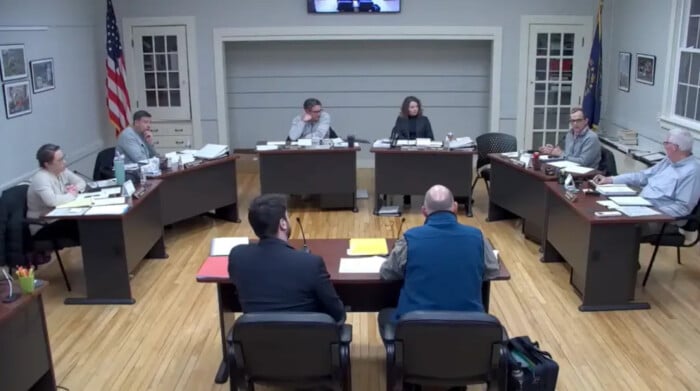Workforce housing proposal before Meredith ZBA scrapped
An application submitted by East Coast Flightcraft for a zoning exception for workforce housing has been rescinded, effectively ending the bid for the development
An application submitted by East Coast Flightcraft for a zoning exception for workforce housing has been rescinded, effectively ending the bid for the development.
The application, submitted in April to the Zoning Board of Adjustment and which sought a variance to construct multi-level employee housing facilities at 189 Waukewan St., was reviewed and continued by the board on May 9.
D&D Realty, LLC, on behalf of Ryan Cardella, a co-owner of East Coast Flightcraft, asked the town to consider authorizing a zoning variance to retrofit a vacant office building in an operating boatyard to contain a maximum of 45 beds. The initial proposal was to construct badly needed workforce housing, in a town where many companies hire seasonal workers from outside the Lakes Region each year.
Public opposition to the project was a primary reason for withdrawing the application, Cardella explained Tuesday afternoon. The project would not have benefitted his company’s bottom line — at least not initially — and proved more of a headache than it was worth.
“It wasn’t a money maker, it wasn’t a business plan,” he said. “We were just looking to help the community. The community didn’t want it.”
The opposition included some who claimed the zoning ordinance did not allow for such a variance, and others who argued allowing the development would cause safety and security problems through incentivizing workers to migrate there.
Cardella told the Meredith ZBA the initial slate of workers would likely be J-1 and HB-2 visa holders, who have already been vetted extensively by the federal government. It would have been companies, not individuals, who would rent out any number of rooms in the development for their workers. Down the line, the plan was to transition the facility to accommodate traveling nurses and recent college graduates, who Cardella said work locally before leaving due to lack of housing.
The developers don’t have immediate plans to submit a new application for the site nor do they have any in the works for another property in the Lakes Region. Cardella said if they do anything at all, they might consider either developing housing on the property for only their own employees or, alternatively, refurbishing the vacant building for office use.
The town is left without a clear and viable solution to the shortage of workforce housing there. Outside of discussions within his companies, Cardella said he isn’t aware of any other efforts to create a similar development in or around Meredith.
“Negative,” Cardella said regarding knowledge of any other efforts to build workforce housing in the region. “That’s why I tried to step up to the plate.”
East Coast Flightcraft operates other properties throughout the Northeast, and Cardella said he’s seen the same situation play out in other resort towns. A lack of workforce housing constricts local businesses, major employers in their respective areas and further degrades the local economy.
“It’s going to be ugly” if a solution isn’t reached, he said. “I’ve seen it happen in other vacation areas in the Northeast.”
The construction plans for the scrapped proposal indicated the building would include two stories of retrofitted dormitory-style housing, fitting two to four people in a private room, and would have also included kitchen and bathroom facilities. Cardella noted similar facilities have alleviated workforce housing shortages on the West Coast and throughout Europe.
In granting D&D Realty a continuance of their application, the ZBA remained skeptical that a use variance could be legally granted under the existing zoning ordinance, but asked Cardella to develop and present a plan to thoroughly interrogate the backgrounds of the individual tenants who would be staying in the facility, above and beyond any government or employment vetting process.
Cardella initially indicated his team believed there was a legal pathway that could allow a special exception, as a portion of the property is already zoned residential. About half of the property in question is zoned residential, but not the portion where the vacant office sits.
This article is being shared by partners in The Granite State News Collaborative. For more information, visit collaborativenh.org.












